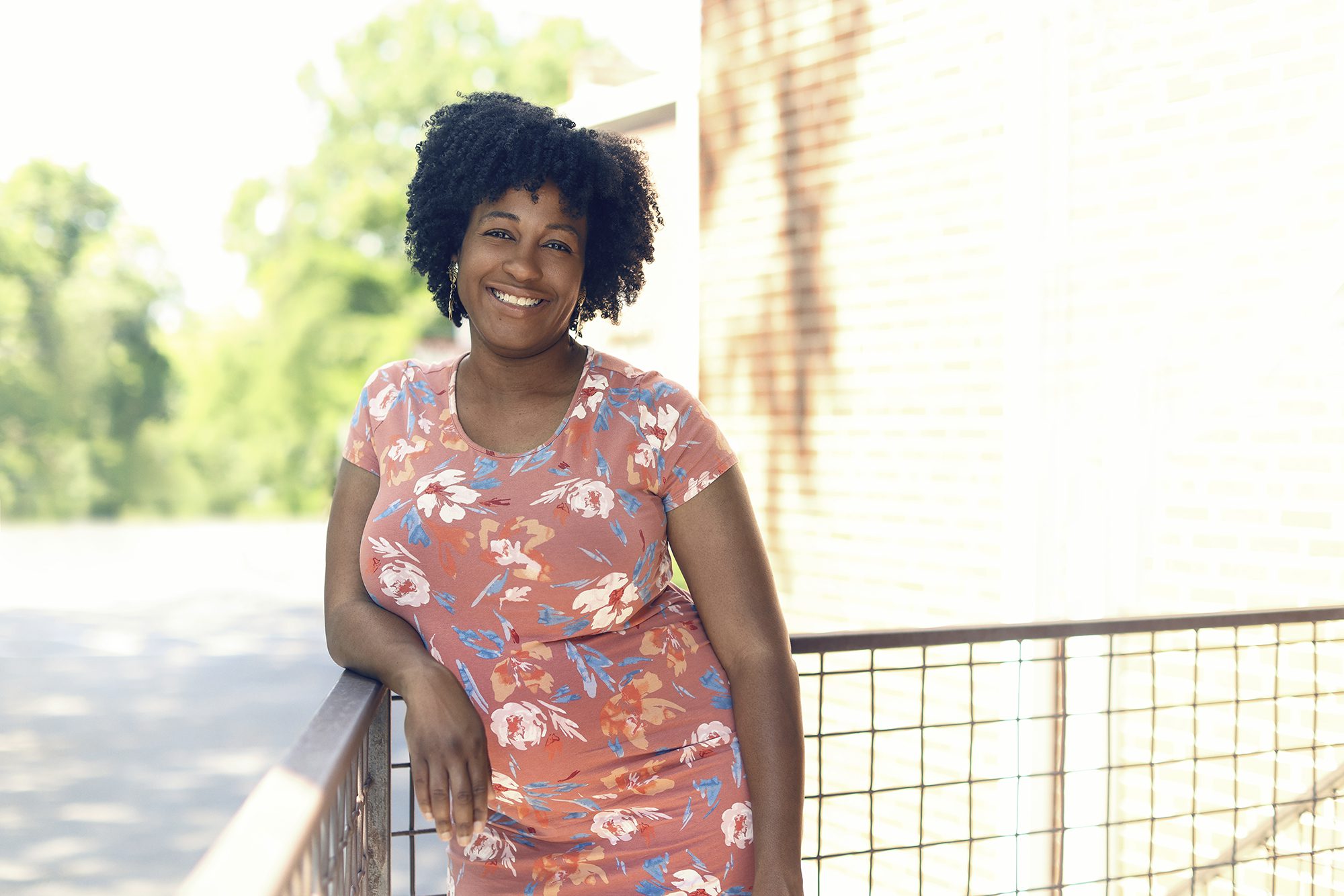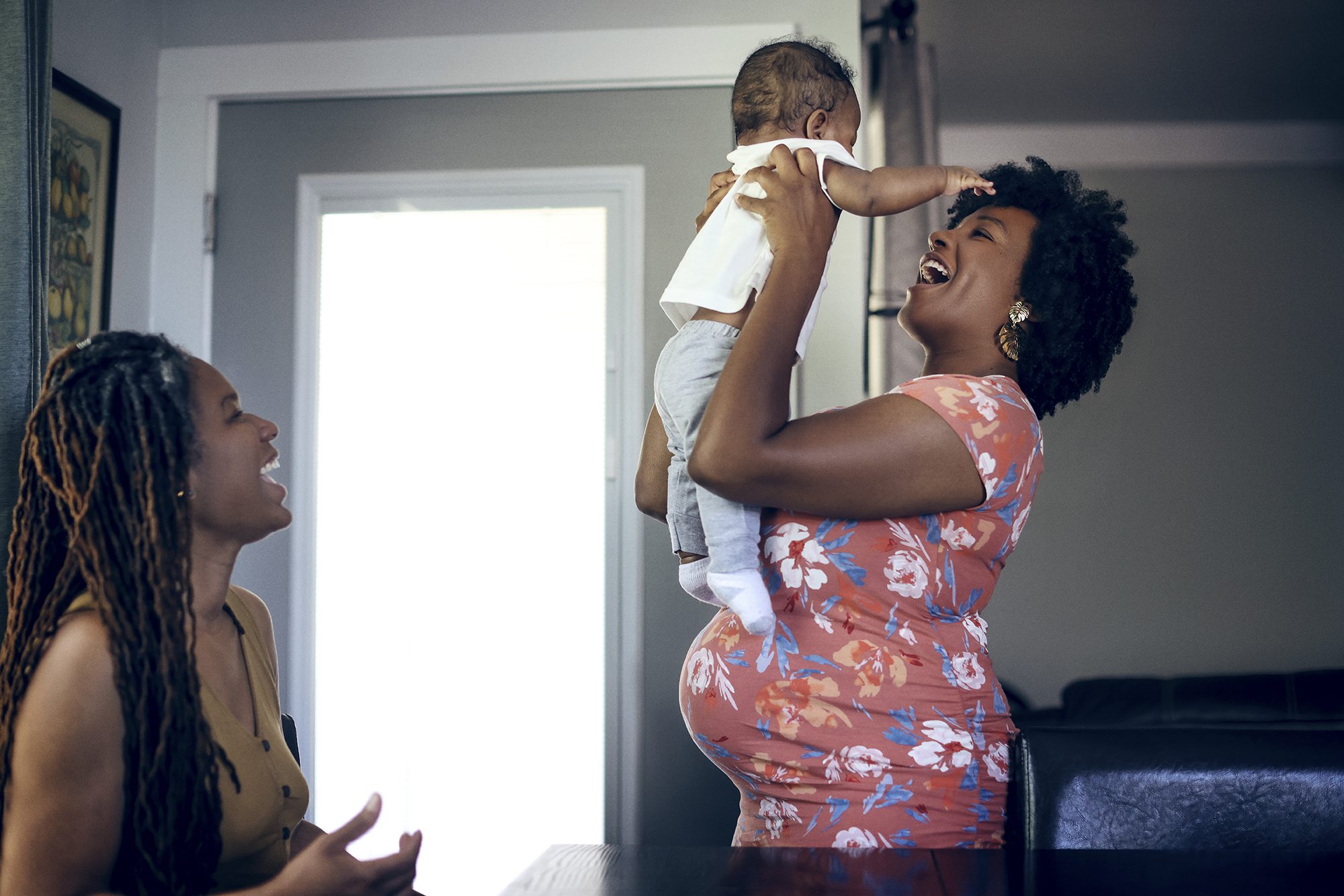This story is part of the Blue Cross and Blue Shield of North Carolina Changemakers series — where we travel the state to find people making a difference in the health of their communities. Read more on our Point of Blue blog.
As a pregnant mother, you spend months preparing for the birth of your child. You change how you eat. You assemble cribs and browse racks of tiny clothing when you’re out shopping. You pack bags of blankets and snacks for the big day. You tune in to the little person inside of you, meeting each soft kick with a hand on your belly, and wonder what they’ll look like. Who they’ll be.
But never do you imagine, in all your careful planning and dreaming, that your child will enter this world on the hard floor of a hospital bathroom.
This unthinkable scenario is exactly what happened to Lareeca Sampson during her first pregnancy. She knew something was happening in her body, but her practitioners weren’t taking her concerns seriously. And that lack of listening cost her the birth experience she wanted and deserved.
She carried this trauma over into her second pregnancy. Whenever she found herself in a clinical setting, her anxiety and blood pressure shot up. It wasn’t healthy for her or her baby. She needed help, guidance, and an advocate. And then, she met Maya Jackson.
Jackson is the founder of Mobilizing African American Mothers Through Empowerment (MAAME), a non-profit organization that empowers Black, Indigenous, and other birthing people of color to navigate health systems; offering resources and support for holistic maternal health and wellness.

Jackson has repeatedly seen the impact that subpar maternal care has had on the Black and Brown community in Durham and surrounding areas. The city is no exception to a nationwide crisis noted by health organizations like the Centers for Disease Control, which finds that Black women are three times more likely to die from a pregnancy-related cause than White women.
“We see the struggles that our clients face trying to navigate care during the most important weeks of their pregnancy. Even though we are in the mix of all these major health institutions, our clients still don’t have access to equitable maternal health care,” Jackson says. “If [OBGYN] providers and health systems don’t accept insurances such as Medicaid, systematic barriers like these create a gap for millions of birthing people, and particularly for Black and other women of color.”
That gap has huge implications on maternal health, given that one out of every five North Carolinians is on Medicaid and 58% of that population are women.
“Community members don’t feel like they have a safe space in traditional medical practices, nor in the hospital… Since the pandemic started, some folks are just opting out [of health systems] completely, due to historical mistrust of the medical system and the current state of maternal health outcomes in the U.S.,” Jackson says. “We’re seeing this across North Carolina from every demographic.”
While there are many physicians who provide excellent and culturally aware care to patients of color, many of Jackson’s clients face difficulties with access. And Jackson says institutional racism and implicit bias within health systems plays a major role in how policies are created, which can negatively impact the type of care a birthing person receives.
“There’s a structure of thinking that there’s only one way to provide care…through a hospital,” she says. “We need a more holistic approach to meet the needs of our community.”
While the traditional maternal care route of doctors and hospital deliveries is ideal and obtainable for some, it isn’t for everyone. Home births and alternative birthing methods like water births are options that have gained popularity—especially during the pandemic—and birthing centers are also on the rise. Personal guidance and care from doulas and/or midwives are other options—ones chosen by Jackson after her own negative experience at a hospital where she delivered her first child in a room full of medical students, despite her request for privacy.
“It threw me off mentally, as I was trying to focus and push my little one out. It was a bit of a difficult birth and process,” Jackson says. “Birthing is an intimate experience. I felt violated while being completely exposed to strangers, like I had no control over my body. I just remember not being heard and not being listened to.”
After she delivered her child, Jackson was unknowingly hemorrhaging for several hours before a nurse came back to check on her.
When Jackson became pregnant with her second child, she incorporated a midwife in her hospital birth. With her third and fourth children, she hired a doula and opted for a birth center. “You’re part of the process instead of just being the vessel for the process, and it’s amazing,” says Jackson. “I felt safe. It was so family-centered, and I thought, ‘How can we create this for other people? I want more people to have access to this type of care.’”
Research has shown that the one-to-one emotional support that doulas provide “is associated with improved outcomes for women in labor,” including shorter labors, fewer complications that require C-sections, and increased maternal satisfaction post-labor.
Jackson, who is now a certified doula herself, founded MAAME to bring these experiences and outcomes to families of color who might not even know they existed as an option. The organization offers its services at an affordable rate, on a sliding scale. They continue to support families who are feeling the pain of systemic disparity after their babies come home—making sure they have access to everything from diapers, breastfeeding supplies, formula and cleaning products, to safe drinking water, transportation and post-partum mental health services.
“We support our families from conception until their toddler is five years old to ensure they have the best support system,” Jackson says.
Blue Cross and Blue Shield of North Carolina (Blue Cross NC) is helping to support the work of MAAME through its Strengthen NC initiative, which invests in organizations led by or serving historically underrepresented communities and people of color through funding and programming. The grant will be used “to create a pathway to sustainability,” says Jackson, as MAAME enters its fourth year. “For newer organizations coming in, those grants typically aren’t available, and so we’re so excited to get it.”
“We’re investing in organizations like MAAME to help eradicate racial inequities that put the health of Black communities at risk,” says Dr. Kia Williams, a medical director at Blue Cross NC. We know that women of color are far more likely to have adverse pregnancy outcomes, often fueled by structural factors outside of their control and implicit bias that negatively impacts their care. We also know that doula care helps reduce serious complications and eases these stressors. We believe the work of women like Maya Jackson is critical in achieving health equity and ensuring every mother has high quality care at every step of the birth journey.”
Jackson’s work through MAAME is making a world of difference for people like Lareeca Sampson. When she felt anxiety well up inside at doctor’s visits, she had coping mechanisms. When she sensed a shift in her body during labor, she found that she had a voice, and an advocate by her side with Jackson as her doula. The provider was summoned, and Sampson welcomed her son in a bed, with people caring for her, encouraging her, and listening to her. The way every mother deserves.

